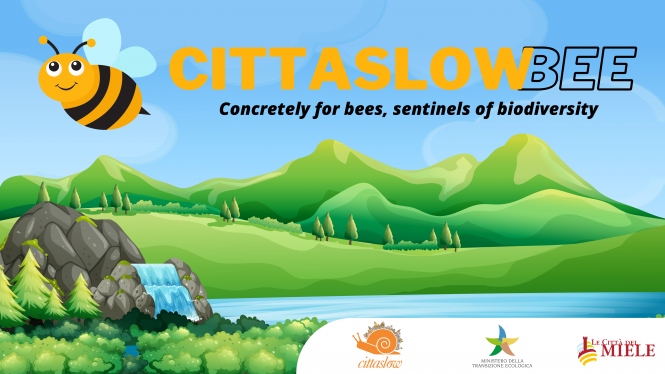May
300 Cittaslow in 32 countries engaged in the protection of bees

How many different types of honey are there in the world? Did you know that each type of honey is different from the next in terms of organoleptic characteristics and qualities, active components and environment? Were you aware of the fact that honey is tasted just like wine or cheese, with a specific tasting technique? We know that honey is the mirror of an area, the result of thousands of micro-withdrawals of nectar by bees and pollinating insects and that for this reason bees are one of the main biological indicators.
In recent years, natural green areas, agricultural land, in the mountains or in the city, have experienced a shortage of bees and other pollinating insects, affected both by climate change and by the massive introduction of chemicals into the environment. Bees can show us what we never notice, they offer precious insight regarding nature’s health conditions, like an actual ecosystem check-up. Flying from flower to flower (they each visit up to 7 thousand a day!), they are responsible for the pollination that leads to the birth of fruits and vegetables which in turn generate the seeds from which new trees are born, at the origin of natural cycles.
The Mayors of the Cittaslow have been at the forefront of the protection of bees for years. And last year "The Manifesto CittaslowBee: concretely for bees, sentinels of biodiversity" was launched internationally: with this document the International Network of the "cities of good living" opens a new perspective of global commitment to sustainability through the defense of this precious insect. The Manifesto for concrete projects was launched on 20th May, World Bee Day, and 22nd May, the International Day for Biological Diversity (IDB).
Why cities? Bees are present everywhere, even in the city: in gardens, on our balconies, in public parks, in abandoned urban areas, in riparian forests, etc.
"Our health - says the President of Cittaslow International and Mayor of Asolo, Italy - is strictly dependent on what we eat, and bees are a crucial and essential sensor for producing healthier and more organic food that helps us preserve our health, in harmony with the planet and with future generations. Overall, as a consequence of Covid-19 we have all understood the value of health”.
Bees guarantee about 35% of global food production in the world, so we can easily understand what the type of "emergency" that we need to address urgently. According to the Italian Higher Institute for Environmental Protection and Research, more than 40% of invertebrate species, especially bees and butterflies, which guarantee pollination, are in danger of disappearing. This is due to pesticides used in agriculture and climate change caused by the unsustainable development of anthropogenic activities. In Jeionju (KOR), from Deidesheim (D) to Mirande (F) and Izmir (TR), etc.,
The Manifesto includes a list of 19 main flower essences suitable for the well-being of bees in public and private spaces and some practical indications for a Municipal Action Plan for the sustainable use of plant protection products in green areas: how to reduce or cancel the use of pesticides, protect bees and biodiversity. For this reason, the Mayors and the communities of Cittaslow have mobilized and have gathered the support of other associations: protecting bees means "securing the future" for the next generations.
ABOUT CITTASLOWBEE POSTER
The main advantages
• Ornamental value.
• Presence of prolonged blooms for many months during the year.
• High utility for bees, butterflies and other pollinating insects.
• Safeguarding the biodiversity of minor fauna and beneficial insects.
• Limited water and cultivation needs (very rustic species are used) and reduced environmental impact.
• Limited maintenance needs.
• Tolerance to diseases and parasites.
• Quick effect, especially for annual species mixes.
• Low management costs.